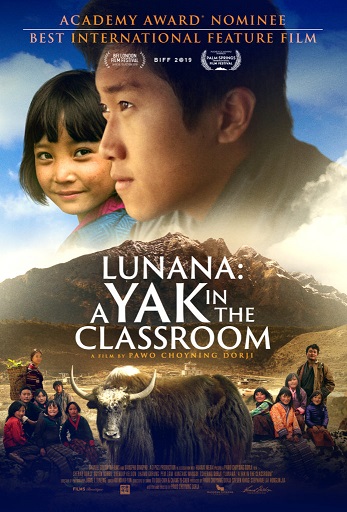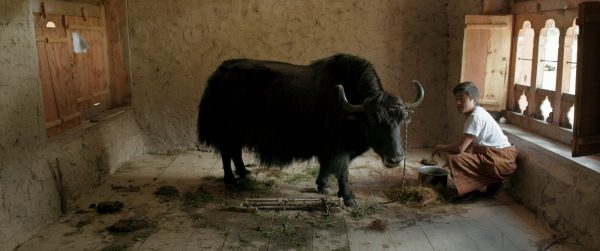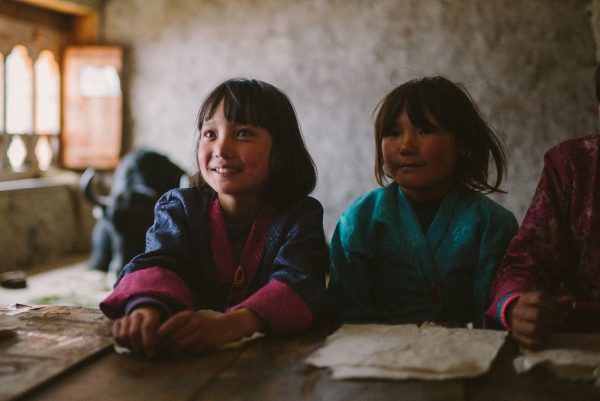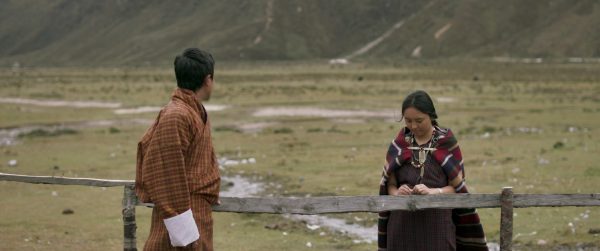
“Lunana: A Yak in the Classroom” (2019 production, 2021 release). Cast: Sherab Dorji, Ugyun Norbu Lhendup, Kelden Lhamo Gurung, Kunzang Wangdi, Tshering Dorji, Tsheri Zom, Sonam Tashi, Tandin Sonam, Dophu, Pem Zam, Dorji Om. Director: Pawo Choyning Dorji. Screenplay: Pawo Choyning Dorji. Web site. Trailer.
If life were to remain stagnant, we’d probably become bored, disillusioned or unfulfilled by the stunning lack of change. That’s especially true for those of us who aspire to something more, to be able to freely express ourselves, regardless of the milieu through which we do so. However, if we’re to realize that objective, we need to make the effort to evolve. But, in attempting to implement that process, we sometimes find that evolution takes on forms that we don’t expect yet nevertheless leave us wholly and pleasantly transformed, providing us with what we need to make that progression possible. So it is for a weary young man looking to steer his life in a new direction in the charming comedy-drama, “Lunana: A Yak in the Classroom.”
Ugyen Dorji (Sherab Dorji) is dissatisfied with his life. As a teacher in the fourth year of a five-year Bhutanese government contract, he’s bored with his work, and it shows in his performance record, which is not up to expectations. He’s not especially enthused about his living arrangements, either, sharing a cramped apartment in the capital city of Thimphu with his grandmother (Tsheri Zom), who raised him after his parents perished. He feels trapped, unable to make any meaningful substantive changes.
Ugyen’s heartfelt desire is to immigrate to Australia to pursue a singing career, and he’s ready to quit and walk away from his teaching job. However, when he meets with his boss, the Education Secretary (Dorji Om), he’s reminded that he’s still under contract and must fulfill his obligations. What’s more, given her dissatisfaction with his track record, she’s not in the mood to extend any favors. In fact, she believes his performance merits reassignment, a prospect that causes his heart to sink, especially when he finds out where he’s being sent. The Secretary sternly informs him that he’s being assigned to fill a teaching position in the remote village of Lunana in the mountains on the Chinese border.
To say the least, Ugyen is stunned. Relocating to Lunana means giving up the relative comforts of the modern world for a Spartan existence, such as learning how to get by without essentials like electricity and cell phone service. The village’s location at altitude with its thin air is also a concern, something Ugyen’s not accustomed to. He attempts to talk his way out of this news, but to no avail; he’s told he must accept the assignment. If there’s a saving grace, he’s informed that the posting is only for a few months; he’s not expected to spend the winter in Lunana, where conditions can become oppressively harsh. But even that reassurance does little to raise his enthusiasm as he embarks on a journey that feels like a jaunt to purgatory.
Upon leaving Thimphu, he takes a bus to a small village that marks the final stop on the route into the countryside. But that’s far from the end of the trip. Upon his arrival, he’s met by two guides, Michen (Ugyun Norbu Lhendup) and Singye (Tshering Dorji), Sherpas of sorts who will escort him to Lunana. They describe the impending trek as an easy journey, but that’s an appraisal based on their perspective. Since they’re accustomed to the prevailing conditions, it’s not a big deal for them. But, for an urbanite like Ugyen, it’s a strenuous adjustment – especially since the journey takes nearly a week on foot through the Bhutanese wilderness, including traversing a high-altitude pass.
Ugyen’s ready to give up even before he reaches his destination, a decision reinforced once he arrives in Lunana. He’s shocked at his primitive living conditions, such as an oven/furnace that’s powered by burning dried yak dung. And then there’s his classroom, which lacks such basics as a blackboard. He’s ready to pack up and leave.

However, despite these circumstances, Ugyen is warmly welcomed by the villagers. He is treated as a respected guest, an honor frequently accorded to teachers in Bhutan. Village leader Asha Jinpa (Kunzang Wangdi) tells Ugyen that he is willing to provide him, within reason, whatever he needs and wants to do his job. Asha is convinced that education is crucial to the children of Lunana, something that’s integral to their personal growth and development. He believes it’s essential to them being able to attain goals greater than becoming simple yak herders, the vocation that most of the townsfolk end up pursuing, usually by default.
With that understanding, Ugyen begins to realize his personal value and that of his profession in ways that he’s never appreciated before. That awareness is amplified when he meets his students for the first time. They show him reverence and a level of respect that floors him. They’re eager to follow his lessons and to do whatever he asks, and the class captain, Pem Zam (Pem Zam), zealously makes sure that her peers adhere to his instructions. The students are exuberantly pleased to have a teacher in the classroom once again, and they take a genuine liking the new arrival. He quickly becomes their favorite, an attitude that gradually but completely changes Ugyen’s outlook.
In addition to the unexpected career satisfaction that Ugyen begins to develop, he also takes a shine to living in Lunana. The stunning beauty of the surroundings is breathtaking, the whimsical nature of his locale is renewing, and the genuine warmth of the residents leaves him feeling loved and appreciated in a way that he has never experienced before. Ugyen also develops a particularly strong affinity for a local musician, Saldon (Kelden Lhamo Gurung). He’s captivated by her mesmerizing voice, and she plays a key role in teaching him the ways of local musical styles, something that has a profound influence on his own artistic sensibilities. Before long, the assignment that Ugyen once dreaded becomes a transformative experience for him personally, vocationally and artistically, and his dreams of relocating to Australia seem to fade into the background. Ugyen genuinely appears to be in his element.
But, with winter approaching, Ugyen is now facing an important decision: Does he depart as originally planned, or does he stay put in the environment he has become so enamored with? It’s a decision he’ll have to live with once he makes up his mind, given that the heavy snow buildup in locations like the mountain pass will invariably prevent his departure until spring. Is he prepared to tough it out under those conditions? Yet is he ready to leave behind what he has so grown to love? This is a decision Ugyen wasn’t expecting when he took on this assignment, but it’s an important one considering the tremendous impact it will have on him and his future. And, even when he finally makes a decision, he may still find himself unprepared for what awaits him, an outcome that provides him with surprises, opportunities and developments he never anticipated.

As this story opens, Ugyen feels like he’s stagnating, stuck in a dissatisfying rut from which escape doesn’t appear likely without taking some drastic measures. And, to his credit, in devising his plan to relocate to Australia, he appears to be doing just that. But, when that scenario is thwarted, he feels like he’s digging himself into an ever-deepening hole, one from which flight has seemingly become impossible. Or is it?
Whatever comes next for Ugyen depends on what he believes, for those intangible resources will determine what unfolds, thanks to the conscious creation process, the philosophy that maintains we draw upon those intangible building blocks in shaping our existence. Indeed, Ugyen knows he needs to change the well-worn tape that’s been playing for far too long, and his immigration plan reflects that. But, as becomes apparent through this odyssey, it’s not enough. It doesn’t provide him with all of the elements needed to manifest a truly transformative experience. He not only needs to change locations, but he also needs to change himself. And, as his story plays out, Australia won’t bring that about, but Lunana just might.
Conscious creation maintains that we’re all continually evolving, that everything is in a constant state of becoming, and it’s apparent Ugyen hungers for that kind of change. But, if he’s to bring that about in his life, he needs to make sure that his next step represents a fundamental alteration. That kind of change begins with who he is, something that he apparently (and rightly) believes will only take place under circumstances that make it possible, namely, in a radically different environment under drastically different conditions from what he’s accustomed to. That’s why he creates the circumstances that make such change occur. He may not be fully conscious of that decision when he embarks on that journey, but, somewhere deep down inside his consciousness, he knows that he’s drawing to himself exactly what he needs to make that transformation materialize. And it gives him precisely what he requires to grow and change as an individual.
Road trip stories like this are perfect narrative settings for showcasing adjustments like those depicted here. Those who set out on such journeys seldom end up being the same people at the end that they were at the beginning, proof that these undertakings accomplish their underlying goals. And, when properly tuned beliefs are in place that make such fulfillment possible, the degree of success is generally more than obvious, even if the intents driving them weren’t readily apparent at the outset.
Those who become engaged in these scenarios can often tell that they’re working if they’re paying attention to what’s going on around them as events unfold. For instance, when perfectly attuned developments occur that further the manifestation of the underlying intents, those at the center of them generally experience synchronicities, coincidences that seem so perfectly tailored to their needs that they just can’t be random happenings. And, when synchronicities unfold in succession, they provide a trail of metaphysical bread crumbs leading us to where we need to end up. These sign posts show us that we’re on the right path, headed toward the fulfillment of our destiny.

The foregoing is clearly the case where Ugyen is concerned. The longer he stays in Lunana and the more comfortable he grows with his circumstances, the more satisfaction he gets out of the experience, providing him with validation that he’s where he’s supposed to be. He experiences a series of “aha!” moments, each offering more proof of that with each passing day. He comes to realize that his “unexpected” reassignment is exactly what he needed to become who he wanted to be, even if he wasn’t aware of that fact when he started out on this journey.
Of course, if we’re to make the most of such scenarios, we must make every effort to be prepared for them. This means shedding beliefs that could get in the way and serve as roadblocks, definite obstacles to our success. This is perhaps most important where fears, apprehensions and limitations are concerned. They can severely undercut efforts like these, reinforcing the stagnation and stalling forward progress. If Ugyen were to allow these hindrances to interfere in his plans, for instance, there’s a good chance he’d be no further along than when he started. And where would that leave him? Thankfully, his experience sets an inspiring example for all of us who want to move forward with meaningful fulfillment.
It’s always gratifying to find a little-known film that delights beyond expectations, as is the case with this uplifting offering from Bhutan. The joys and insights that emerge throughout the adrift protagonist’s experience open his eyes to fresh new possibilities that he hadn’t previously considered for his life and his art. Heartening sentiments, gorgeous cinematography and skillfully nuanced performances abound, despite some occasional tendencies toward obvious but forgivable predictability. Director Powa Choyning Dorji’s debut feature showcases the work of a promising new talent who appears poised to deliver elegant, beautiful and revitalizing work from the rooftop of the world. This Oscar nominee for best international feature is available for streaming online.
Moving forward may not be an easy process, no matter how much we hope it will be. We may even view certain developments as setbacks that seemingly deter our efforts. However, if we trust the path we’re on, we often find that we’re headed in the right direction, that the fortuitous changes awaiting us are squarely on the horizon and readily within our sights. And, when we at last come upon them and what they have to offer us, we can proceed with ease and speed, taking us to our desired destination and the rewards that accompany our arrival.
Copyright © 2022, by Brent Marchant. All rights reserved.

No comments:
Post a Comment